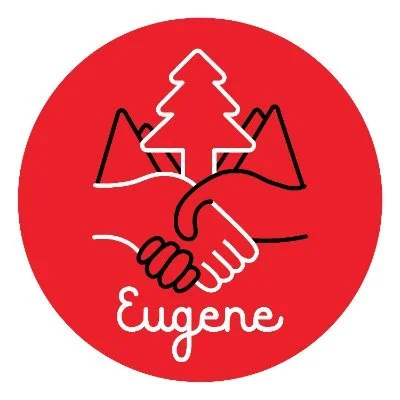

Statement on Police Killing of Charlie Landeros
Eugene DSA extends our deepest condolences to the family and friends of Charlie Landeros, who was gunned down by Eugene Police in front of their daughter at the doors of Cascade Middle School Friday morning. Charlie’s community organizing and commitment to justice touched many lives in the Eugene area, and their absence will be sorely felt across our community.
As the story broke, eventually becoming international news, misinformation spread quickly. Initially, it was reported as a school shooting with the victim identified as “the shooter”, but later we learned that only police fired any shots. Television news offered wall-to-wall coverage, but simply parroted police reports, and misled the public about the nature of the incident.
The details of Charlie’s killing are still unclear. Why were police called to the school? Why did they choose to use lethal force? We demand transparency as the investigation into Charlie’s killing unfolds. Any and all footage of the incident must be released to the public. Numerous documented cover-ups across the country show that police cannot be trusted to investigate a shooting by their own officers. The city must support an independent investigation into the shooting.
In the United States, police kill over one thousand people each year. Despite making up only 38% of the population, people of color make up 52% of those killed by police. A much lower rate of police killings elsewhere in the world and the successful apprehension of even the most violent show that these deaths at the hands of police are avoidable. Now this ongoing national tragedy has visited us here in Eugene. From our grief and rage over this tragic and unjust killing, our community must, together, build a movement to stop this barbarity.
We demand accountability for the officers that killed Charlie and accountability for any and all police or municipal leaders who put into place policies that allowed this tragedy. We demand an end to the violence visited on our community by the police.
To support an independent investigation into Charlie’s killing, please donate to the Civil Liberties Defense Center, an organization Charlie was deeply involved with, making sure to add the note “in memory of Charlie Landeros”.
In Solidarity,
Eugene DSA

January 7th - #NoAmazonNYC
In our first broadcast, State Senator Julia Salazar joined us to discuss the impact of Amazon's plans for HQ2 in Long Island City and the #NoAmazonNYC coalition that's organizing against it.
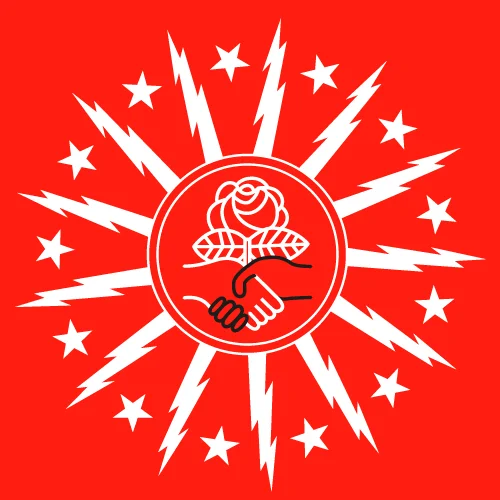

The Labor Theory of Value
In order to explain exactly what socialism is, and how it works, it is important to first understand what the wealth in our society is, and where it comes from. It is a question of whether or not the people who actually create products of material value get to keep the fruits of their own labor, or even a fair portion of the profits, and the answer is that the lion’s share goes to someone else.
Ordinarily, this wouldn’t be a problem if the system self-regulated and produced livable conditions for the worker – if the “invisible hand” as Adam Smith put it, always succesfully provided social benefits through the actions of an individual driven by profit. The truth is that market interactions and price signals are very effective for regulating exchange itself, but the benefits seldom actually reach the people who created the value behind them in the first place.
What is Capitalism?
Capitalism has many possible definitions, but when socialists use the word “capitalism” we are referring to a system of private ownership in which one person, or a small group of individuals, owns and controls a company’s means of production, and is able to exclude access to them.
These means of production are called “private property” or “capital” and include tools, machinery, raw materials, buildings, real estate, etc. A “capitalist,” therefore, is a person who owns capital.
Think of capitalism as an economic monarchy: The shareholders or owners hand orders down, and they are passed through the chain of command until they get all the way to the bottom to you, the worker.
Value and Where it Comes From

In Wealth of Nations, Adam Smith explained the Labor Theory of Value like this:
“The real price of everything, what everything really costs to the man who wants to acquire it, is the toil and trouble of acquiring it. What everything is really worth to the man who has acquired it, and who wants to dispose of it or exchange it for something else, is the toil and trouble which it can save to himself, and which it can impose upon other people. What is bought with money or with goods is purchased by labour as much as what we acquire by the toil of our own body. That money or those goods indeed save us this toil. They contain the value of a certain quantity of labour which we exchange for what is supposed at the time to contain the value of an equal quantity. Labour was the first price, the original purchase-money that was paid for all things. It was not by gold or by silver, but by labour, that all the wealth of the world was originally purchased; and its value, to those who possess it, and who want to exchange it for some new productions, is precisely equal to the quantity of labour which it can enable them to purchase or command.“
Socialists like to use the example of a chair. A chair has use-value: Someone can sit on it. It is much preferable to standing, and it’s safe to say that at least one chair can be found in nearly every American home. Use-value is a difficult thing to measure, though. Exactly how urgently is a chair needed? We can sit on the floor if we want. We might lie down instead. Some cultures don’t even use chairs.
Well, we can roughly approximate the use-value of a chair, instead, by seeing how much of something else a person is willing to trade for it. This is called “exchange-value.” A chair’s exchange-value might be worth $20, or 5 yards of raw lumber, or 6 hammers, or 1 peacoat. Simply put, a chair’s exchange-value increases or decreases by the laws of supply and demand.
But why does the chair have an exchange-value at all? For this, we refer to Adam Smith’s Wealth of Nations. It is the “toil and trouble of acquiring it.” If you could walk out of your house, and pluck a chair from a tree, it wouldn’t be worth much. It is precisely because a carpenter has taken raw materials and converted them into a chair through labor input, that it has acquired its value.
In order to build a chair, the carpenter needs wood, a hammer, a saw, and glue. He needs to get these items from someone else who made them, so he buys them for whatever their exchange values are. He then puts all of those items together to build a chair by spending a few hours sawing, hammering, and glueing. By the time he is done, the exchange-value of the chair has increased, and he can now sell it.
If he did nothing to the wood, hammer, saw, or glue and then tried to sell it, its value would have never increased. It would remain the same. So, we know that the value of the labor that he put into building the chair is the difference between the cost of his materials and the amount that he sold it for.
Labor Relations Under Capitalism

To continue with our chair analogy, the capitalist is a person who owns the wood, the hammer, the glue, and the saw that are needed to make the chair. The capitalist hires the carpenter to build a chair, and then he sells the chair for its exchange-value.
With the money he received, he keeps enough to replace the tools and raw materials that went into the chair in order to build another, and is left over with the amount of money equal to the labor that went into producing it.
The capitalist now decides what to do with the remainder of the money, which we call the surplus. First, he must pay the laborer’s wages, then he must keep a remainder of the surplus as profit. Adam Smith, here, considers profit a wage paid to the capitalist for the risk and labor of purchasing and managing the tools, raw material, and labor. But, the fact remains that the laborer did the majority of the actual input that turned the raw material into a chair.
As an experiment to see what the capitalist’s actual labor input is to the end product, let’s supose we left him alone with the wood, glue, hammer, and saw; and see what happens now that he took the risk of purchasing the stock. . . nothing. He needs a carpenter, or nothing will happen.
Even if you consider the capitalist more skilled, better compensated, or more essential to production than the worker, the chair still won’t get built without actual labor input. The capitalist can have a brilliant idea for a chair, and purchase mounds of wood, and take every ounce of “risk” that can be taken, but without employees to build chairs, he will have never increased the exchange-value of whatever he already has in order to be sold for a profit. The mere idea to undertake a venture is not sufficient justification to assume an employer had a greater amount of labor input in a process that simply couldn’t happen without his employees – especially to the extent we see in modern society where some employers receive hundreds of times the compensation that their employees do.
Henry George uses the example of gathering eggs in Progress and Poverty:
“A company hires workers to stay on an island gathering eggs, which are sent to San Francisco every few days to be sold. At the end of the season, the workers are paid a set wage in cash. Now, the owners could pay them a portion of the eggs, as is done in other hatcheries. They probably would, if there were uncertainty about the outcome. But since they know so many eggs will be gathered by so much labor, it is more convenient to pay fixed wages. This cash merely represents the eggs — for the sale of eggs produces the cash to pay the wages. These wages are the product of the labor for which they are paid — just as the eggs would be to workers who gathered them for themselves without the intervention of an employer.
In these cases, we see that wages in money are the same as wages in kind. Is this not true of all cases in which wages are paid for productive labor? Isn’t the fund created by labor really the fund from which wages are paid?”
So the leftover money that the capitalist is taking from the value of the chair that he sold for profit, largely comes from the labor of the worker – who didn’t get it.
Now we look back to the hammer: Someone had to cut down wood, and someone had to mine iron to get the raw materials for the hammer. Someone had to build a road that the raw materials are shipped on. Someone had to build the truck that carried the raw materials to the factory. Finally, a worker at the factory took the raw materials, and converted them into a hammer. None of these items simply popped into existence in the hands of the capitalist: they were purchased with the existing labor of the working class.
This is what Adam Smith means by “labour was the first price, the original purchase-money that was paid for all things.”
In capitalism, people who are already wealthy start off by having the money to purchase and control capital. The barrier to entry in production, and their exposure to risk is reduced compared to a person who owns nothing and has no choice but to sell their labor in order to live. When a capitalist is allowed to take surplus value from the labor that his employees as a whole produce, and make decisions with it, he is compelled to make choices that benefit himself. This doesn’t mean that capitalists are bad people. It is their job to increase profits however they can.
Adam Smith hoped that an employer would realize that having well-paid, happy employees would be to his or her own benefit. The opposite is true. Employers have an incentive to suppress wages, cheapen production, deprive workers of benefits wherever possible, and automate their own workforce out of the job. This was verified strikingly in the deplorable working conditions of the industrial revolution.
From a classical liberal perspective, this is the beauty of the free market. It’s flexible, efficient, and if you can’t earn enough money to survive, it’s your own fault. But, this looks a lot different when you start to see capitalism as system of an unaccountable minority on top, driven by greed, stealing from the very people who made them wealthy, and using the money to change legislation, and undermine democracy in order to further concentrate their own wealth.
Is this theory true? Well, if the labor theory of value is true, we would be able to see a divergence between productivity and compensation, because the people producing the value would not be getting it. Let’s check:
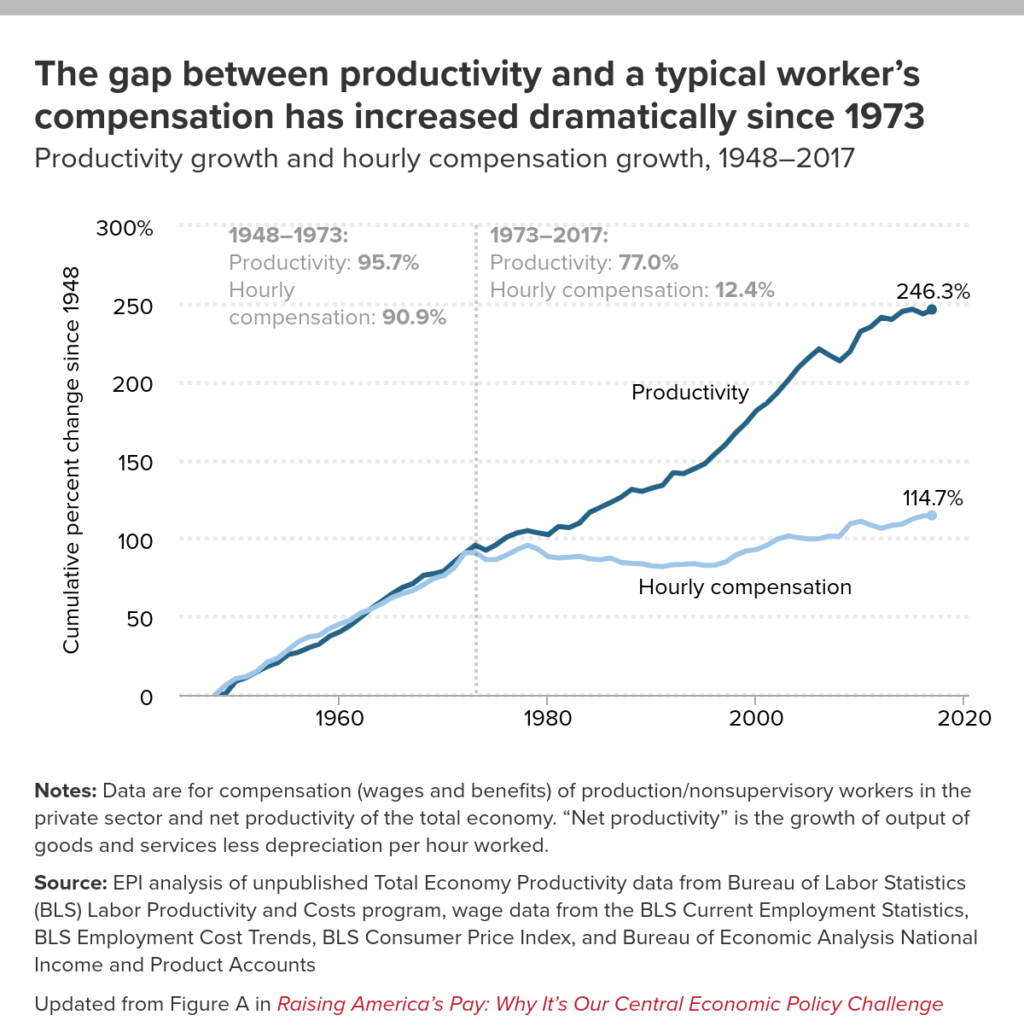
Socialism
Karl Marx first articulated the Labor Theory of Value as a system in which surplus value is actually taken from the person producing it. Socialists take a look at the material input and the labor input, and recognize that it is a buildup of human labor that no one person has a right to control.
Since the workers and the capitalist both brought value to the product that is being sold: one put in the material half, and the other added the labor, socialists believe that it is only fair (and in the best interest of society, anyway) that everyone who had a share in producing the final product should have a say in how it is used.
The “abolition of private property” and “collective ownership over the means of production” essentially just means that we believe the workplace should be run democratically. The company as a whole should hire and fire their managers, set wages, arrange benefits and goals, and determine how to increase profits. One person or a small group of people should not be allowed to suck wealth out of people who have no choice but to continue producing it in exchange for a bare existence.
W. E. B. DuBois said of democracy, “the best arbiters of their own welfare are the persons directly affected.” Workers will not vote to give power back to a tiny minority. They will not vote for pitiful wages or non-existent benefits. They will not vote to outsource their own jobs or work grueling hours.
Socialism is the belief that we should build a society based on worker self-management or “collective ownership,” mutual aid, and the basic principle that everyone is equal and has an equal right to exist.
What’s more: we see socialism as an urgent necessity. Capitalism is not equipped to deal with so-called “externalities,” that is, social consequences of an exchange that are not reflected in the cost of goods or services that are being produced and traded. Climate change is one such externality.
The global climate crisis is a threat to human existence, and we only have about a decade before we begin dealing with the repercussions in a very tangible way. As long as we live in a society driven by personal gain, the looming threat of human extinction will remain a mere footnote in our priorities.
Seize the means of production.


We support the UNC teaching assistant and professor strike against white supremacy!
In response to the Board of Trustees decision to re-enshrine Silent Sam, a monument to UNC students who fought in defense of slavery and white supremacy, worker-activist Maya Little and others at UNC have called on all UNC TAs and faculty to withhold final grades for the semester until the following demands are met:
That the Board of Governors (BOG) organize a meeting and listening session with student and community anti-racist activists to discuss the fate of Silent Sam. Until now the University has shut these groups out of the ostensibly public discussion of the statue’s fate through police intimidation, undercover surveillance, and libel by University officials.
-
That the BOT disclose the “necessary changes” to campus policing that they claim to have already begun implementing, and that they withdraw the proposed security escalations, specifically:
The increased use of “intelligence gathering” and “protest management” by UNC Police;
The formation of a 40-person “mobile force” of police to deploy in response to protests, costing $2 million per year;
The allocation of $500,000 to equipment costs for this mobile police force.
That the BOT withdraw its proposal for a $5.3 million “indoor location” to house Silent Sam on UNC’s campus, and that the statue remain off campus.
That the University withdraw its plan to raise student fees by $65.39 for building maintenance, and to instead use the $5.3 million allocated to house Silent Sam and the yearly $2 million allocated for increased policing to 1) pay for the needed repairs 2) increase wages for graduate and campus workers 3) provide dental insurance for graduate workers, and 4) reduce parking costs for all workers.
The NC Piedmont Democratic Socialists of America are proud “outside” agitators for our comrades, friends, partners, neighbors, and coworkers at the University. We stand in total solidarity with the anti-racist protesters who have suffered police brutality and harassment. We stand in total solidarity with the workers who were punished because they stood up for each other and their community. We call on the Orange County DA to drop charges against the anti-racist activists who were arrested at the December 3rd protest.
The $5.3 million proposed for building this new shrine could be put to far better use: tens of thousands of people rendered homeless by Hurricane Florence survivors are still waiting for adequate housing and basic assistance; the state continues to cite costs to justify its refusal to expand Medicaid; University workers face rapidly rising costs of living; TAs make just $20,000 a year; and UNC students suffer from the school’s disastrously inadequate mental health resources.
The claims that Silent Sam honors only the soldiers and not their cause, or that they represent “our” heritage, are embarrassingly ahistorical. Of the hundreds of students who volunteered to fight in the Civil War, five are known to have fought in the Union army. Those who fought for the confederacy represented a narrow slice of the state’s population delimited by class and geography. The statue was funded by the United Daughters of the Confederacy, who also lauded confederate soldiers as “the real Ku Klux Klan.” In the statue’s 1913 dedication speech, white supremacist Julian Carr celebrated the Confederacy’s defense of the purity of the “Anglo-Saxon race” and bragged that he “horsewhipped a negro wench.” If he were alive today, Silent Sam would demand that Maya Little and large swaths of the University community be chained, beaten, and worked to death. Those who built the statue were explicit in their agreement with this sentiment toward non-white lives. To support its continued presence on campus on any grounds, nonsense about heritage aside, is to support the chronic intimidation of non-white students and their exclusion from public spaces. Acceptance of this hostility is acceptance of white supremacy in the large, and to punish black students for their resistance is materially to support racial oppression.
We call on the University to cease insulting black faculty by ignoring their scholarship on the racist history of Silent Sam while expecting them to tolerate the hateful, banal, and ignorant chants of white supremacists in the name of “discourse.” We also demand that the University and the town of Chapel Hill investigate seriously the asymmetric treatment given to racist and anti-racist protestors. We have evidence of police silencing, intimidating and legally harassing specific protesters to hamstring the anti-racist movement. We have multiple witnesses to multiple instances of violence toward protesters, including an officer telling one protester that “no one cares” that the protester could not breathe (the officer was wrong). Given this behavior and the known connections between members of the Chapel Hill PD and violent racist groups, it stretches credibility that the police have no ideological interest in suppressing left and anti-racist voices while sheltering white supremacists.
In light of these facts, the Piedmont Democratic Socialists of America joins students, faculty, the Durham Workers Assembly, and other anti-racists in calling on the University to let Silent Sam’s removal be permanent, to cease tolerating the white supremacist rallies now taking place regularly at the former site of the statue, and to put the millions of dollars proposed for the statue’s restoration instead toward materially supporting the workers and TAs whose labor is the bedrock of the University.
Any comrades reading this who want to help the anti-racist activists activists facing criminal charges for resisting white supremacy at the UNC Chapel Hill, please consider donating to the Anti-Racist Activist Fund at https://bit.ly/2E6J5aF


Rabbi Michael Feinberg on multi-faith labor organizing and what he learned from the Catholic left
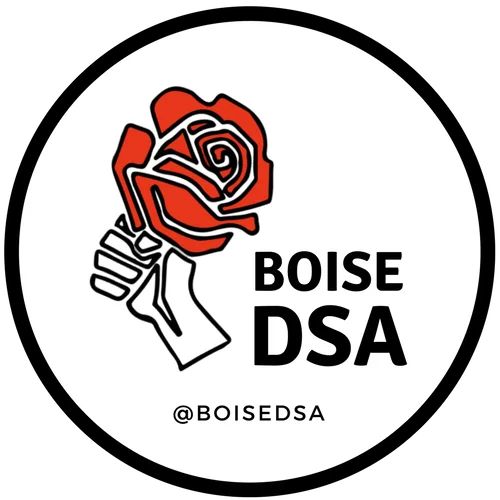

October General Meeting - Housing (Updated)
What: Discussion with Lori Decaire from Vanishing Boise
When: October 18th - 7 PM
Where: Xanadu (5015 Bond St)
Agenda
- 7:00 introduction and updates
- 7:10 Discuss level of association with PSL (Will Boise DSA Co-host events with PSL?)
- 7:40 Housing, City Government, and Power with Lori Dicaire (Discussion with Noah)
- 8:05 Open discussion
- 8:25 Happy Birthday for Rachel (and Sarah) and Solidarity
Minutes:
Summary Minutes, Boise DSA General Meeting, 10/18/18, 5015 Bond St.
Meeting start: 7:08 PM. End 8:30 PM
Christine Baylis started meeting. All attending at that point introduced themselves. Eventually 23 people attended.
In response to some initial, general questions, Andrew Chumich, Christine and others noted that: All interested people are welcome at these general monthly meetings as well as at monthly steering committee meetings. New member meetings are intended for new members. The agenda for general meetings is set at the steering committee meetings. The DSA is a national organization. Membership in the national DSA as an individual person is done on line after paying dues. The organization has local and regional chapters. Membership in the local Boise DSA is not currently formalized. Anyone interested can attend. No dues are currently collected. The national organization is not yet sharing national membership dues with the Boise DSA.
7:22 PM: 1st main item: Presentation by guest speakers, Lori Dicaire and Noah Kelley.
Lori, as the founder of Vanishing Boise, noted that Idaho generally and Boise specifically are experiencing extensive growth. The lack of affordable housing in Boise is a problem.
In determining what is built in Boise, the chief legal instrument is zoning. All the various zoning categories are too numerous to enumerate, but the general criteria for zoning classification are Boiseans’ health, welfare, and safety.
How areas are zoned obviously has an affect on the building of affordable housing. For example, the designation of “industrial” for the Blue Valley Mobile Home park may make that park unsuitable for residents currently there.
Airbnb is another rental possibility in Boise that could be used for affordable housing.
Lori was especially concerned about the over-promotion of Boise as a place to move to. A growing population has meant housing price increases.
Lori noted, Boise promotes itself, at taxpayers’ expense, as a place to move to. Example: the website for LIV Boise.
Lori advocates for cutting off such promotion of Boise and using that money for needs of the current population.
Lori also expressed concern about “upzoning” and population density.
In general, Lori left the impression that the administration of Boise favors promoting growth while the city’s level of commitment to affordable housing in that growth is unclear. Boiseans need to make their voices heard in favor of affordable housing.
Lori noted that there will be a public meeting sponsored by Vanishing Boise and other groups interested in affordable housing to which the city administration will be invited. The date has not yet been set.
8:15 PM: 2nd main item: cooperation with Party of Socialism and Liberation (PSL)
Some voiced the opinion that the PSL was a top down organization in its flow of ideas and such a structure did not fit with the bottom up, grass roots emphasis on consensus the DSA wants to encourage.
Others felt the PSL shared some of the same goals as DSA, and we should work together with the PSL on those common goals. We have little to lose here in Idaho since we are thought of anyway as irredeemable socialists, just like the PSL.
With not enough time remaining, this issue was tabled for the next meeting.
Submitted by Steven Csik
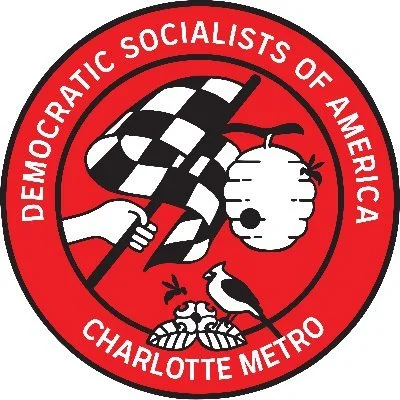

Charlotte Metro DSA Opposes all 6 North Carolina Constitutional Amendments
The Charlotte Metro Chapter of the Democratic Socialists of America (CLTMDSA) strongly opposes the six NC constitutional amendments slated for the November 2018 ballot. These amendments are unintelligible jargon, unreadable, and ultimately part of a concentrated GOP power grab to gerrymander and take powers away from other elected officials. We urge others in the Charlotte-Metro region to also vote against all six amendments. Read more about them below.
Amendment 1: Photo ID voting requirement
This will require voters to show photo ID before casting a ballot. Defenders of these laws claim that IDs reduce voter fraud; however considering in-person voter fraud is extremely rare, requiring voters to show identification is more of “a solution in search of a problem.” The reality is that these ID laws prevent many from exercising their right to vote and are discriminatory against the poor, racial minorities, and other vulnerable groups.1
Amendment 2: Create an eight-member bipartisan election board
Under current North Carolina law, the election board consists of nine members – four from the governor’s party, four from the other major party, and one independent – with the governor overseeing the board. This amendment will reduce the nine-member election board down to eight, all of which would be appointed by the general assembly thus taking power away from the governor.2 As the current governor is a Democrat, this amendment is simply a blatant power grab by the Republican- controlled legislature.
Amendment 3: Reduce the state income tax cap from 10% to 7%
As Democratic Socialists, we believe that people should pay their fair share and that if you have more, you should pay more in order to create a society that meets the needs of all. This amendment would cap the income tax at 7%, thus concentrating more wealth for the wealthy while putting more financial burden on lower-income earners and potentially cutting funds from needed services.
From the News & Observer: “A state’s revenue needs can vary unpredictably over time and income tax caps eliminate flexibility. If income taxes can’t be raised to meet needs, a state’s primary alternative is to raise sales taxes (and various usage fees). Sales taxes (and usage fees) impact poor people much more than they impact wealthy people: Poor people must spend most of their income, subjecting most of their income to sales tax, while wealthier people spend a much lower percentage of their income. Moreover, [this specific cap] locks in rates that are lower than recent historical rates and the new flat-rate tax structure shifts more of the income tax burden to lower earners. Other states such as Kansas that have lowered tax rates dramatically have had poor results. We are already seeing hints of the impact in N.C. with a precipitous drop in inflation-adjusted per student spending in public schools.”3
Amendment 4: Establish a merit system for filing judicial vacancies
This amendment is another attempted power grab by the NC GOP and shifts the power of who appoints judges between elections from the governor to the state legislature. Instead of the governor making appointments, anyone in the state may submit recommendations to the general assembly who will then provide the names of two NCGA-selected nominees to the governor. The governor will then have to select from between those two nominees who are not subject to gubernatorial veto. If a vacancy occurs right before an election, the chief justice of the N.C. Supreme Court is then tasked with the appointment instead of the governor.4
Amendment 5: Protect the right to hunt, fish, and harvest wildlife
There is no current threat to these activities in the state, and having this on the ballot is more so an attempt to get the GOP base to show up to the polls. Since the amendment refers to making these “preferred means of managing and controlling wildlife,”5 this also causes ecological concerns in that it could result in reduced protections for wildlife areas and habitats. It also defers hunting and fishing laws to the general assembly, which takes power away from local groups to establish regulations and create or maintain protected wildlife areas. Again, this is nothing more than another attempted power grab by the state legislature.
Amendment 6: Add rights for victims of felony crimes
As Democratic Socialists, we stand for the abolishment of prisons and the carceral state. This particular amendment is dangerous as it could result in even more people in prisons and with harsher sentencing. There are also risks that this could create even more bias against defendants facing trial.
Mark Rabil, law professor at Wake Forest University says, “Obviously everybody agrees victims should have rights, but the way I see the goal of Marsy’s Law is so much more than that................. The bottom line is
they’re giving victims and victims’ families constitutional party status that can override the constitutional rights of a defendant to a fair trial and the right of districts attorneys to pursue cases in ways they perceive to be fair.”6
On top of the fact that the criminal justice system already largely discriminates against vulnerable communities and racial minorities, this amendment is an open door to further exacerbate that discrimination and create even more disparity within our justice system.
CLTMDSA sees these amendments as disingenuous and not in the best interest of the people of North Carolina. Rather these efforts are to increase GOP control, consolidate power for the wealthy, and create more inequality for the most vulnerable in the state. Please join us in voting NO on all six in November.
1https://www.aclu.org/other/oppose-voter-id-legislation-fact-sheet 2 https://longleafpolitics.com/nc-constitutional-amendments-2018/
3https://www.newsobserver.com/opinion/op-ed/article214823780.html 4https://longleafpolitics.com/nc-constitutional-amendments-2018/ 5https://www.newsobserver.com/news/politics-government/article216437935.html 6https://www.charlotteobserver.com/news/politics-government/article218118890.html


Charlotte Metro DSA statement on BDS
Charlotte Metro DSA
unequivocally supports Palestinian liberation, unequivocally condemns the State of Israel’s occupation and colonization of all Arab lands, unequivocally supports the fundamental rights of Arab-Palestinian citizens of Israel to full equality,
unequivocally supports the rights of Palestinian refugees to return to their homes and properties,
unequivocally condemns the Israeli sniper massacre of Palestinian protesters and Israeli bombardments of Gaza,
unequivocally calls for the U.S. embassy to be moved back to Tel Aviv,
and unequivocally endorses the Boycott, Divestment, Sanction movement." from 9/9/18


DSA Hurricane Florence Recovery Efforts
It is never the bosses who are forced to pay the piper when the consequences of their decisions come calling.
The devastation caused by Hurricane Florence was no accident: its human impact can be linked directly to centuries of deliberate policy choices. The size and severity of the storm was almost certainly exacerbated by anthropogenic climate change. Further, North Carolina’s past as a slaveholding state was made apparent in which communities in eastern NC were devastated and which stayed dry; richer, whiter communities usually have the higher ground, while Black communities were founded on the cheaper floodplains (including some of the few extant cities born from Emancipation during Reconstruction). The Lumbee tribe of Scotland and Robeson counties, where Hurricane Matthew struck hard in 2016, have now seen their homes flooded twice in two years. The people of those communities now sit under the weight of even more water this time, feeling abandoned and ignored by policymakers.
The environmental toll that will be paid by the working class communities half-drowned in this storm is one levied by decision-makers far away from places like Lumberton and Spring Lake. Concentrated Animal Feeding Operations (CAFOs) are the name of the game that feeds major multinational corporations like Smithfield. In Duplin and Samson counties, they are thick on the ground with pigs and pig shit. These farms, when they aren’t facing a meter of rain falling over less than a week, cause noxious environmental impacts as it is. With the wall of water that was brought by Florence, they turn the floodwaters into county-sized septic tanks, exposing those just trying to survive the storm to disastrous environmental waste.
And then there’s Duke Energy and its thrice-damned coal ash. Already responsible for poisoning the Dan River in northern NC and tainting groundwater in Robeson county, the coal ash did no favors to communities already reeling from the storm. At least two coal ash ponds breached during the storm, adding arsenic and other carcinogens into flood waters spilling their way out to sea in the Cape Fear river…on top of contributing the carbon production that made Hurricane Florence as severe as it was.
We say enough. We say that the people who are hurting the most in the wake of this storm should not be forced to pay the price of it. And we are asking for your help.
NC Piedmont DSA, Charlotte DSA, and Charleston DSA have come together to form the Florence Recovery Working Group. By fundraising and recruiting volunteer labor for service organizations that are working with people in need in the storm zone, we are looking to show that the only answer to such catastrophes is a socialist one. We owe a debt of gratitude to our comrades in Houston DSA, whose admirable and ongoing work in the wake of Hurricane Harvey last year inspired the formation of this effort and have informed our work through the invaluable resources they have shared with us.
To start with, we are working with two service organizations whose principles are compatible with DSA’s: Mutual Aid Carrboro, who helped coordinate air-drops of supplies to the city of Wilmington as it was cut off from land access during the storm, and the North Carolina A. Philip Randolph Institute, a union-affiliated service organization with deep ties to communities of color statewide. We will be operating in an accountable and transparent fashion with any group that chooses to partner with us, and will be distributing the funds we raise with frequency. Money that just sits in an account for months on end while people suffer does no good.
But this is just the start. North Carolina is going to be a long time recovering from this storm and, in the end, the only answer to the current barbarism is socialism.
If you are interested in donating money, you can give via Venmo to @DSAFlorenceRecovery and Square Cash at $DSAFlorenceRecovery. You can also find a list of needed materials and physical locations to donate them to here.
If you are interested in getting involved, there is a volunteer intake form here, and you can contact the Working Group at FlorenceRecovery@dsanc.org.
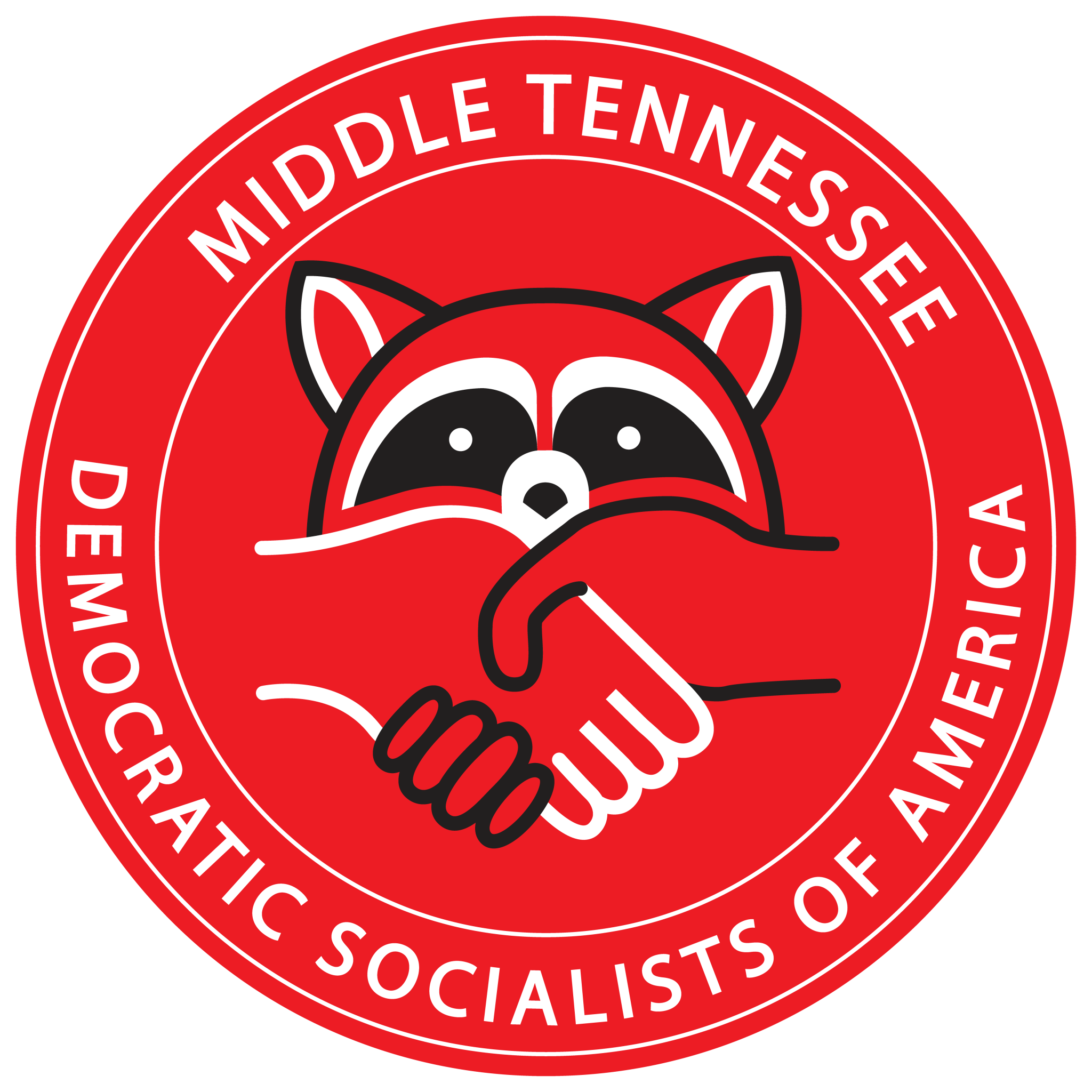

Middle Tennessee DSA Endorses Prison Strike

PER THE RESOLUTION PASSED AT THE JULY 2018 GENERAL MEETING, the Middle Tennessee chapter of Democratic Socialists of America endorses the upcoming National Prison Strike called by incarcerated men and women. This strike, which begins on August 21 and extends through September 9, 2018, is a response to the April 2018 uprising at Lee Correctional Institution in South Carolina, during which seven men lost their lives.
Behind prison walls, individuals encounter brutality and exploitation that can only be understood by those who have shared in the experience. With roughly 5% of the world’s total population but 25% of the world’s total prison population, the United States incarcerates the highest number of people in the world in both absolute and relative terms. Mass incarceration perpetuates modern day slavery, and as socialists, we seek to dismantle this system of exploitation, dehumanization, and subjugation. We see that the true goal of the carceral state is not to rehabilitate or protect, but to deny humanity and further the rancid institution of slavery that undergirds this country in the name of profit.
We know that dehumanization through criminalization, which begins for many at a young age, haunts our neighborhoods and communities by stripping individuals of their autonomy and agency. In Middle Tennessee, we further recognize that gentrification exacerbates this phenomenon; North Nashville, a historically Black community that has been cyclically plundered and neglected by the ruling class of the city since former slaves settled here 150 years ago, and which is once again under assault from both developers and local government, experiences an incarceration rate of 14% — the highest in the nation. People who have lived in our communities for decades are being pushed out in the same way that the colonizers of this continent displaced indigenous tribes who inhabited these lands for generations. As before, those who refuse to move will have the boot of the state pressed on their neck.
Mass incarceration is not an aberration but rather the product of a system created with the express purpose of ensuring that those profiting from the exploitation of society’s most marginalized will continue to do so. This is a system built by the creators of the United States of America and maintained by the forces of both capital and the state. The alliance between capitalism and the state is on full display when CoreCivic, the largest private prison corporation in the world, headquartered in Nashville, pays both its shareholders and sympathetic politicians dividends extracted through the misery of imprisonment. These profiteers are the direct ideological descendants of the architects, benefactors, and overseers of the Atlantic slave trade.
We support the demands of this strike, which are:
- Immediate improvements to the conditions of prisons and prison policies that recognize the humanity of imprisoned men and women.
- An immediate end to prison slavery. All persons imprisoned in any place of detention under United States jurisdiction must be paid the prevailing wage in their state or territory for their labor.
- The Prison Litigation Reform Act must be rescinded, allowing imprisoned humans a proper channel to address grievances and violations of their rights.
- The Truth in Sentencing Act and the Sentencing Reform Act must be rescinded so that imprisoned humans have a possibility of rehabilitation and parole. No human shall be sentenced to Death by Incarceration or serve any sentence without the possibility of parole.
- An immediate end to the racial overcharging, over-sentencing, and parole denials of Black and brown humans. Black humans shall no longer be denied parole because the victim of the crime was white, which is a particular problem in southern states.
- An immediate end to racist gang enhancement laws targeting Black and brown humans.
- No imprisoned human shall be denied access to rehabilitation programs at their place of detention because of their label as a violent offender.
- State prisons must be funded specifically to offer more rehabilitation services.
- Pell grants must be reinstated in all US states and territories.
- The voting rights of all confined citizens serving prison sentences, pretrial detainees, and so-called “ex-felons” must be counted. Representation is demanded. All voices count.
We call for solidarity between those of us whose only chains are wage labor and the incarcerated individuals who will begin striking on August 21. Through solidarity we will support those caught in the snare of the prison industrial complex until and after they are free. Through solidarity we will break down the walls that the racist, classist, sexist bourgeoisie erected to separate us. Through solidarity alone will we create a future for all of us that exists without chains or bars.